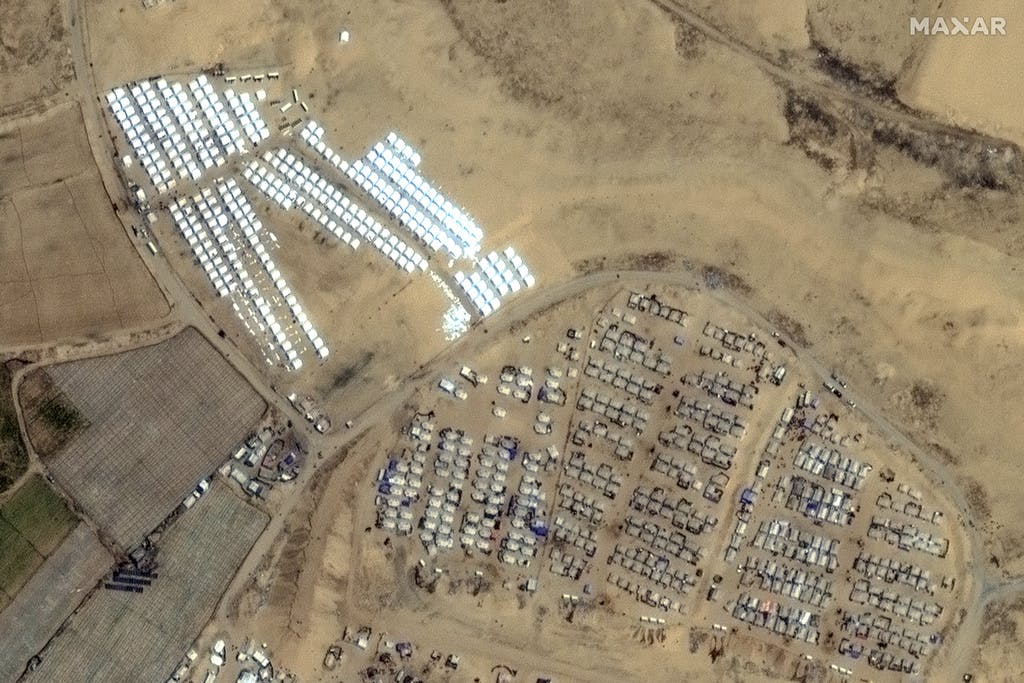A Tale of Two Tent Cities: Israel Builds One Near Rafah as Anti-Israel Protesters Defend Another at Columbia University
Perhaps influenced by a growing anti-Israel protest movement on America’s campuses, the Department of State is raising the stakes, claiming a Rafah operation would lead to ‘inordinate’ harm to civilians.

Far away from the tent encampment being fought over on Columbia University’s campus, the Israel Defense Force is quietly building a tent city in the heart of Gaza as it gears up for the final assault on Rafah, Hamas’s last stronghold.
Israel’s insistence on completing the task of dismantling the military power that perpetrated the October 7 massacre is facing heavy resistance from President Biden. Perhaps influenced by a growing anti-Israel protest movement on America’s campuses, the Department of State is raising the stakes, claiming a Rafah operation would lead to “inordinate” harm to civilians.
A Rafah invasion that avoids unacceptable civilian casualties “would not be a simple operation, but it is clearly doable,” a former head of research in the IDF intelligence division, Yossi Kuperwasser, tells the Sun. “There are extensive empty areas around Rafah,” to where more than a million civilians sheltering in that city could be evacuated.
The Associated Press is publishing satellite images, taken in the course of three days between last Thursday and Sunday, showing a fast-growing tent city in an empty space between Rafah and Khan Yunis. The encampment could reportedly house more than a million people and would include three field hospitals to treat the injured and the ill.
Even before a Rafah evacuation can begin, Israel must avoid immediate humanitarian crises, Mr. Kuperwasser says: “Most urgently, we must ensure there is enough water and shade in Gaza now, as the next couple of days are going to be extremely hot.”
The complex evacuation of Rafah’s civilians into a tent city would take three weeks or more. It would be done “in coordination with the U.S., Egypt, and other Arab countries such as the United Arab Emirates,” an Egyptian official told the Wall Street Journal.
An updated IDF plan for Rafah envisions a gradual operation, according to Israeli press reports. In the course of up to six weeks, the military would take over the city in stages, at each point calling on civilians to evacuate to designated areas where they can take temporary shelter, such as the tent city.
While America opposes the plan, it is increasingly resigned to the notion that Israel will carry out its operation at Rafah, Kann News reports, adding that rather than force the IDF to stand down, Washington is now attempting to help shape the operation to reduce civilian casualties. Publicly, though, the administration is amplifying its objection to any movement on Rafah.
“We don’t want to see Palestinians evacuated from Rafah unless it is to return to their homes,” the Department of State spokesman, Matthew Miller, said Monday. “There’s no way to conduct an operation in Rafah that would not lead to inordinate civilian harm and would severely hamper the delivery of humanitarian assistance.”
Israel sees Rafah as an unfinished part of the war. Hamas’s last four organized divisions, as well as its Gaza commander, Yahaya Sinwar, and its military chief, Mohammed Deif, remain in that city’s tunnels. Rafah is also a point of entry into Gaza from Egypt, where arms and materiel are smuggled for Hamas.
Israel also believes that the vast majority of the 133 hostages who were kidnapped on October 7 are being held at Rafah. The plight of the abductees, and fears that the number of those who are dead is fast growing, is tearing the country apart.
American-led diplomacy designed to reach a deal between Israel and Hamas is widely seen at a dead end. American officials acknowledge that while Israel made considerable concessions, the hostage-takers refused to budge. While Hamas has made demands, “Israel has moved some way to meeting those demands, and Hamas has then changed their demands,” Mr. Miller said Monday.
Yet, worries about the hostages, including six American citizens who are believed alive, are increasingly far from America’s headlines. On campuses, where a mix of anti-Zionism, antisemitism, America-hatred, and terror-worship are all the rage, there is outright hostility to the mere idea that Israel was victimized by a ruthless enemy intent on its destruction.
Asked to condemn aggression at Columbia University, Mr. Biden hedged his bet. “I condemn the antisemitic protests,” he said Monday. “That’s why I’ve set up a program to deal with that. I also condemn those who don’t understand what’s going on with the Palestinians.”
The president spoke after a meeting with an avid supporter of the anti-Israel protesters, Representative Alexandria Ocasio-Cortez. Meanwhile, oceans away from the ugly campus scenes, the IDF, which has withdrawn most troops from the Strip, is now recalling many units as it prepares for a decisive Gaza battle.
“Rafah will not be Rafah as it is currently,” the commander of the only division that currently operates inside Gaza, Brigadier General Itzik Cohen, told Kann News on Tuesday. “No Hamas will survive there, no arms will be smuggled there, and no hostages will remain there.”

